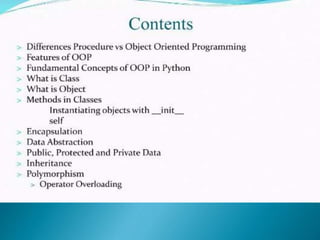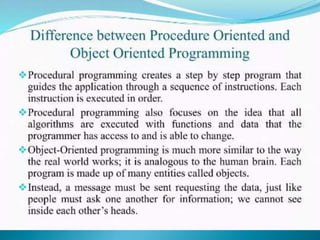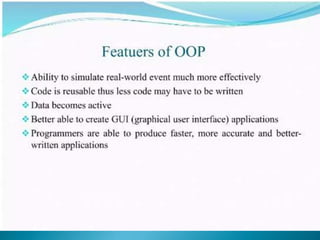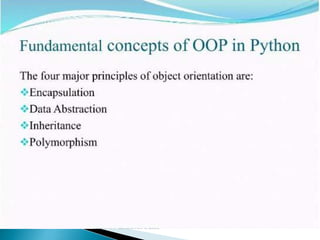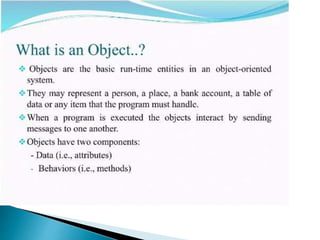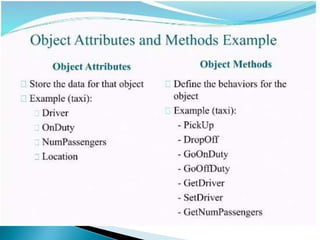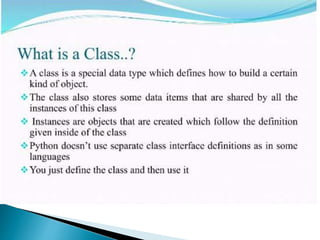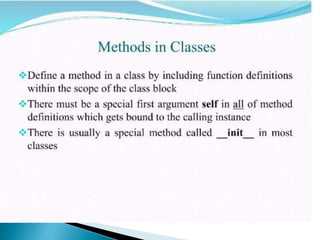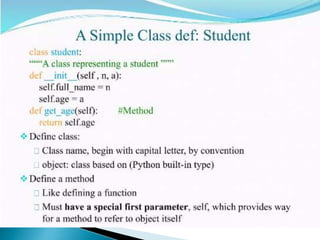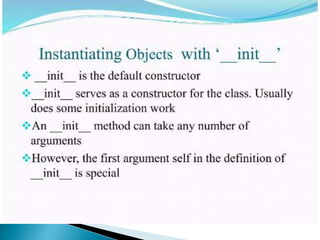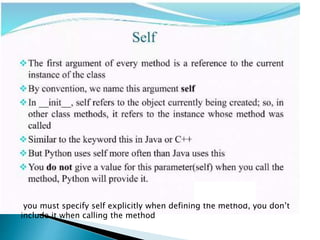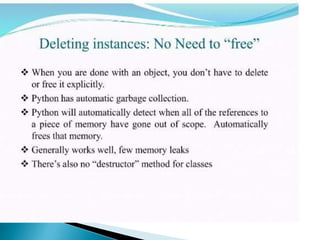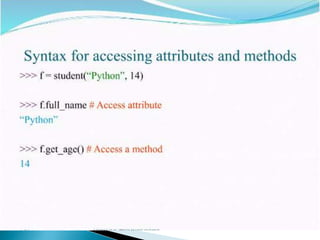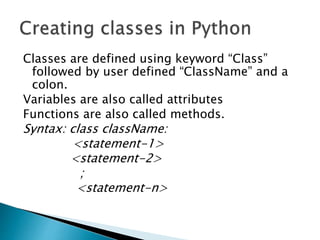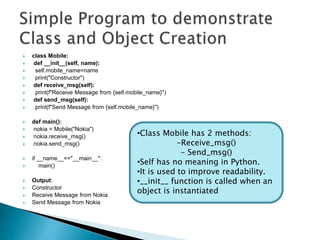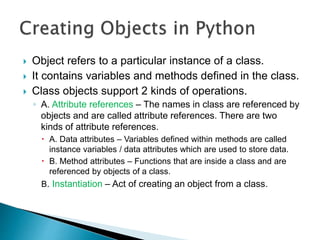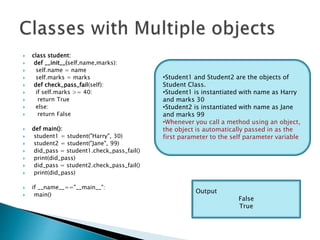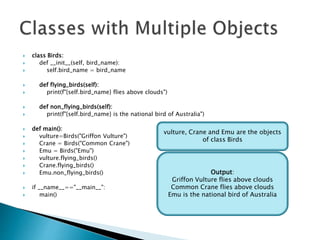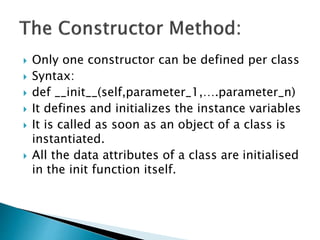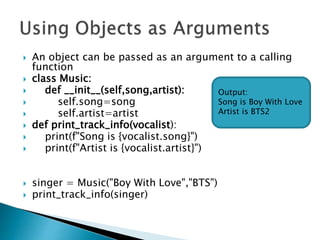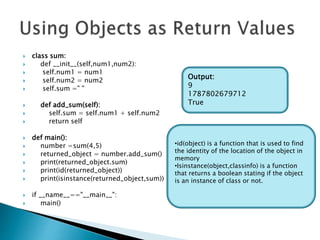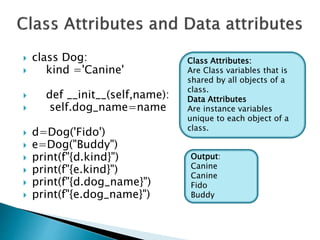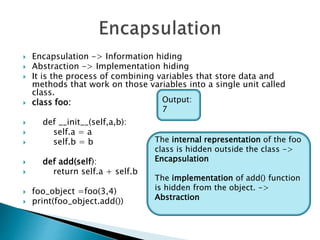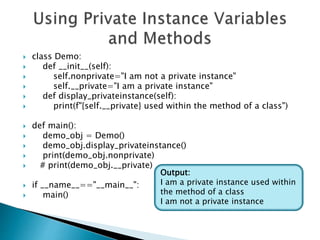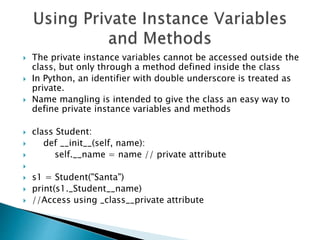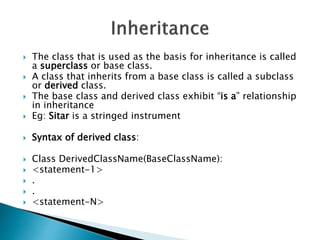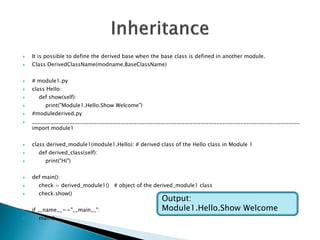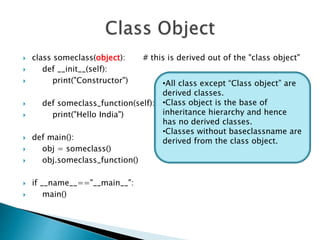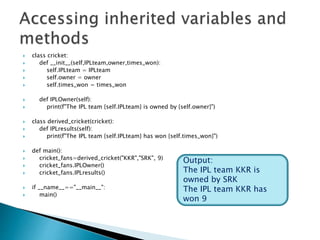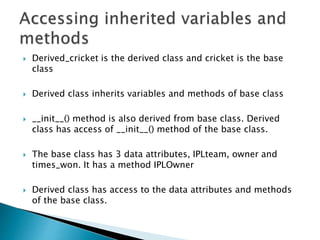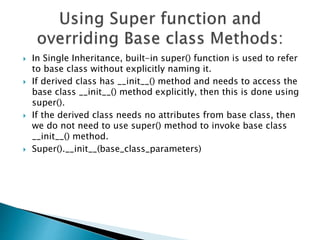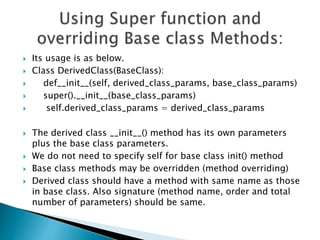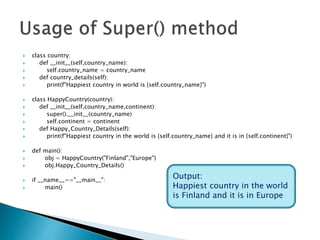Python_Object_Oriented_Programming.pptx
- 11. you must specify self explicitly when defining the method, you don’t include it when calling the method
- 14. Classes are defined using keyword “Class” followed by user defined “ClassName” and a colon. Variables are also called attributes Functions are also called methods. Syntax: class className: <statement-1> <statement-2> ; <statement-n>
- 15. class Mobile: def __init__(self, name): self.mobile_name=name print("Constructor") def receive_msg(self): print(f"Receive Message from {self.mobile_name}") def send_msg(self): print(f"Send Message from {self.mobile_name}") def main(): nokia = Mobile("Nokia") nokia.receive_msg() nokia.send_msg() if __name__=="__main__": main() Output: Constructor Receive Message from Nokia Send Message from Nokia •Class Mobile has 2 methods: -Receive_msg() - Send_msg() •Self has no meaning in Python. •It is used to improve readability. •__init__ function is called when an object is instantiated
- 16. Object refers to a particular instance of a class. It contains variables and methods defined in the class. Class objects support 2 kinds of operations. ◦ A. Attribute references – The names in class are referenced by objects and are called attribute references. There are two kinds of attribute references. A. Data attributes – Variables defined within methods are called instance variables / data attributes which are used to store data. B. Method attributes – Functions that are inside a class and are referenced by objects of a class. B. Instantiation – Act of creating an object from a class.
- 17. class student: def __init__(self,name,marks): self.name = name self.marks = marks def check_pass_fail(self): if self.marks >= 40: return True else: return False def main(): student1 = student("Harry", 30) student2 = student("Jane", 99) did_pass = student1.check_pass_fail() print(did_pass) did_pass = student2.check_pass_fail() print(did_pass) if __name__=="__main__": main() •Student1 and Student2 are the objects of Student Class. •Student1 is instantiated with name as Harry and marks 30 •Student2 is instantiated with name as Jane and marks 99 •Whenever you call a method using an object, the object is automatically passed in as the first parameter to the self parameter variable Output False True
- 18. class Birds: def __init__(self, bird_name): self.bird_name = bird_name def flying_birds(self): print(f"{self.bird_name} flies above clouds") def non_flying_birds(self): print(f"{self.bird_name} is the national bird of Australia") def main(): vulture=Birds("Griffon Vulture") Crane = Birds("Common Crane") Emu = Birds("Emu") vulture.flying_birds() Crane.flying_birds() Emu.non_flying_birds() if __name__=="__main__": main() Output: Griffon Vulture flies above clouds Common Crane flies above clouds Emu is the national bird of Australia vulture, Crane and Emu are the objects of class Birds
- 19. Only one constructor can be defined per class Syntax: def __init__(self,parameter_1,….parameter_n) It defines and initializes the instance variables It is called as soon as an object of a class is instantiated. All the data attributes of a class are initialised in the init function itself.
- 20. An object can be passed as an argument to a calling function class Music: def __init__(self,song,artist): self.song=song self.artist=artist def print_track_info(vocalist): print(f"Song is {vocalist.song}") print(f"Artist is {vocalist.artist}") singer = Music("Boy With Love","BTS") print_track_info(singer) Output: Song is Boy With Love Artist is BTS2
- 21. class sum: def __init__(self,num1,num2): self.num1 = num1 self.num2 = num2 self.sum =" " def add_sum(self): self.sum = self.num1 + self.num2 return self def main(): number =sum(4,5) returned_object = number.add_sum() print(returned_object.sum) print(id(returned_object)) print(isinstance(returned_object,sum)) if __name__=="__main__": main() Output: 9 1787802679712 True •id(object) is a function that is used to find the identity of the location of the object in memory •Isinstance(object,classinfo) is a function that returns a boolean stating if the object is an instance of class or not.
- 22. class Dog: kind ='Canine' def __init__(self,name): self.dog_name=name d=Dog('Fido') e=Dog("Buddy") print(f"{d.kind}") print(f"{e.kind}") print(f"{d.dog_name}") print(f"{e.dog_name}") Output: Canine Canine Fido Buddy Class Attributes: Are Class variables that is shared by all objects of a class. Data Attributes Are instance variables unique to each object of a class.
- 23. Encapsulation -> Information hiding Abstraction -> Implementation hiding It is the process of combining variables that store data and methods that work on those variables into a single unit called class. class foo: def __init__(self,a,b): self.a = a self.b = b def add(self): return self.a + self.b foo_object =foo(3,4) print(foo_object.add()) Output: 7 The internal representation of the foo class is hidden outside the class -> Encapsulation The implementation of add() function is hidden from the object. -> Abstraction
- 24. class Demo: def __init__(self): self.nonprivate="I am not a private instance" self.__private="I am a private instance" def display_privateinstance(self): print(f"{self.__private} used within the method of a class") def main(): demo_obj = Demo() demo_obj.display_privateinstance() print(demo_obj.nonprivate) # print(demo_obj.__private) if __name__=="__main__": main() Output: I am a private instance used within the method of a class I am not a private instance
- 25. The private instance variables cannot be accessed outside the class, but only through a method defined inside the class In Python, an identifier with double underscore is treated as private. Name mangling is intended to give the class an easy way to define private instance variables and methods class Student: def __init__(self, name): self.__name = name // private attribute s1 = Student("Santa") print(s1._Student__name) //Access using _class__private attribute
- 26. The class that is used as the basis for inheritance is called a superclass or base class. A class that inherits from a base class is called a subclass or derived class. The base class and derived class exhibit “is a” relationship in inheritance Eg: Sitar is a stringed instrument Syntax of derived class: Class DerivedClassName(BaseClassName): <statement-1> . . <statement-N>
- 27. It is possible to define the derived base when the base class is defined in another module. Class DerivedClassName(modname.BaseClassName) # module1.py class Hello: def show(self): print("Module1.Hello.Show Welcome") #modulederived.py ____________________________________________________________________________________________________ import module1 class derived_module1(module1.Hello): # derived class of the Hello class in Module 1 def derived_class(self): print("Hi") def main(): check = derived_module1() # object of the derived_module1 class check.show() if __name__=="__main__": main() Output: Module1.Hello.Show Welcome
- 28. class someclass(object): # this is derived out of the "class object" def __init__(self): print("Constructor") def someclass_function(self): print("Hello India") def main(): obj = someclass() obj.someclass_function() if __name__=="__main__": main() •All class except “Class object” are derived classes. •Class object is the base of inheritance hierarchy and hence has no derived classes. •Classes without baseclassname are derived from the class object.
- 29. class cricket: def __init__(self,IPLteam,owner,times_won): self.IPLteam = IPLteam self.owner = owner self.times_won = times_won def IPLOwner(self): print(f"The IPL team {self.IPLteam} is owned by {self.owner}") class derived_cricket(cricket): def IPLresults(self): print(f"The IPL team {self.IPLteam} has won {self.times_won}") def main(): cricket_fans=derived_cricket("KKR","SRK", 9) cricket_fans.IPLOwner() cricket_fans.IPLresults() if __name__=="__main__": main() Output: The IPL team KKR is owned by SRK The IPL team KKR has won 9
- 30. Derived_cricket is the derived class and cricket is the base class Derived class inherits variables and methods of base class __init__() method is also derived from base class. Derived class has access of __init__() method of the base class. The base class has 3 data attributes, IPLteam, owner and times_won. It has a method IPLOwner Derived class has access to the data attributes and methods of the base class.
- 31. In Single Inheritance, built-in super() function is used to refer to base class without explicitly naming it. If derived class has __init__() method and needs to access the base class __init__() method explicitly, then this is done using super(). If the derived class needs no attributes from base class, then we do not need to use super() method to invoke base class __init__() method. Super().__init__(base_class_parameters)
- 32. Its usage is as below. Class DerivedClass(BaseClass): def__init__(self, derived_class_params, base_class_params) super().__init__(base_class_params) self.derived_class_params = derived_class_params The derived class __init__() method has its own parameters plus the base class parameters. We do not need to specify self for base class init() method Base class methods may be overridden (method overriding) Derived class should have a method with same name as those in base class. Also signature (method name, order and total number of parameters) should be same.
- 33. class country: def __init__(self,country_name): self.country_name = country_name def country_details(self): print(f"Happiest country in world is {self.country_name}") class HappyCountry(country): def __init__(self,country_name,continent): super().__init__(country_name) self.continent = continent def Happy_Country_Details(self): print(f"Happiest country in the world is {self.country_name} and it is in {self.continent}") def main(): obj = HappyCountry("Finland","Europe") obj.Happy_Country_Details() if __name__=="__main__": main() Output: Happiest country in the world is Finland and it is in Europe
